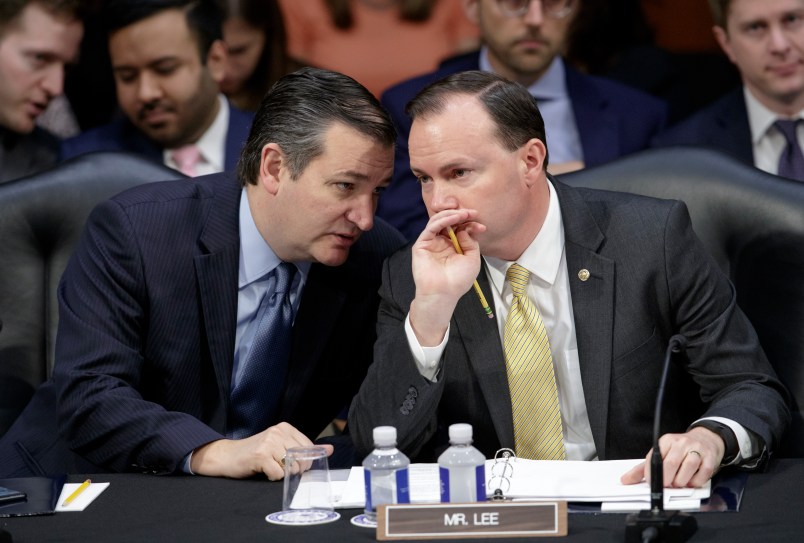There have been no hearings, the public has not yet seen the final bill text, the Congressional Budget Office has not yet released its score, and several prominent Republicans are calling for a delay. Still, the Senate is barreling towards a vote on the GOP bill to repeal the Affordable Care Act by the end of this week.
With a much slimmer majority than Republicans enjoy in the House, and much of their caucus publicly criticizing the bill from the right and from the center, the vote could come down to just a handful of lawmakers—who are right now being inundated with calls, protests, and attack ads.
Here are the senators to watch:
The hardliners
Four staunch conservatives—Sens. Rand Paul (R-KY), Ted Cruz (R-TX), Mike Lee (R-UT) and Ron Johnson (R-WI)—announced last week that they oppose the bill in its current form, saying it fails to fulfill “the most important promise that we made to Americans: to repeal Obamacare and lower their health care costs.” But the senators left themselves plenty of wiggle room, signaling they would be open to supporting the bill with certain tweaks.
Cruz has proposed an amendment that would allow insurers to sell cheap, skimpy plans that don’t include the essential health benefits—like prescription medicine and maternity care.
Lee released his own long diatribe against the bill and called for an amendment allowing states to opt out of all federal health care regulations—particularly community rating—and design their own systems.
Johnson wants the bill to gut Obamacare’s protections for people with pre-existing conditions.
Paul has derided the bill in its entirety as “Obamacare-lite” but left the door open to holding his nose and supporting it if Republicans cannot muster the votes.
The moderates
The Senate’s moderate Republican women—who were at first excluded from the back-room negotiations around the bill—have emerged as a potential formidable force against the legislation. Sens. Susan Collins (R-ME), Lisa Murkowski (R-AK) and Shelley Moore Capito (R-WV) all represent states with many elderly and rural residents and high levels of additions whose access to health care would be devastated by the bill. The three have voiced serious concerns about the deep cuts to Medicaid, the complete defunding of Planned Parenthood for one year, and the expectation that premiums and deductibles would sharply increase for many Americans.
Murkowski’s vote, however, may be influenced by a special carveout for her state in the text of the bill—dubbed the “Klondike Kickback”—that would cushion Alaska and other sparsely populated states from a formula in the cuts that otherwise penalizes blue states for spending generously on their programs.
The swing votes
Sen. Dean Heller (R-NV), who just happens to be up for reelection next year, voiced his opposition to the bill in fairly strong terms last week. The only changes he outlined that would win his vote—preserving the Medicaid expansion or increasing Medicaid spending to make up for phasing out the expansion—are extremely unlikely to be adopted.
Another vulnerable member up for reelection from a Medicaid expansion state, Sen. Jeff Flake (R-AZ), has been more coy about where he stands, saying he needs more time to review the bill.
Sen. Bill Cassidy (R-LA), a longtime critic of both the bill’s secretive drafting process and draconian Medicaid cuts, and the author of an alternative health care bill that has gone nowhere in the Senate, is similarly on the fence. He said, vaguely, that his vote could be won by removing “things in this bill that adversely affect my state.”
Sen. Rob Portman (R-OH) also remains non-committal even as his governor, John Kasich (R), has come out in vocal opposition.
Meanwhile, freshman Sen. Ben Sasse (R-NE), who has kept his vote and views close to his chest throughout the health care negotiation process, said over the weekend that he remains uncommitted. He criticized the bill for not fully repealing Obamacare’s regulations and noted, not inaccurately, that it is “largely a Medicaid reform package.”











McConnell was saved from polio as a child thanks to government funded research and healthcare.
His gratitude is none existent. Where do humans develop such morals? If he was with polio today unjder his plan, he would be left without any resources to fight his disease…not even the research for the vaccine would be funded.
Amazing times we live in. I guess the answer is everyone should buy and carry a loaded gun…that seems to be the only right in the US these days.
Ted Cruz hasn’t been in the lime light for quite a while so we should be prepared for his need to get his “attention fix,” a pre-existing condition, and making an ass of himself, also a pre-existing condition.
My first guess would have been to watch all the Trump voters who are going to get bigly shafted by this farce of a repeal.
I keep on having this horrible thought, which is to find all the paranoid schizophrenics in the US, and all the crazy fans of stars, and email them with, “did YOU know that Jodie Foster [Insert star name] is fucking Ted Cruz [Insert evil Senator name]”. I have this thought a dozen times per day.
You have a sedge of cranes, a murder of crows, a badling of ducks, a convocation of eagles, even an array of hedgehogs.
Why not a concupiscence of Republican legislators?
These people want to screw everybody, even their own supporters.